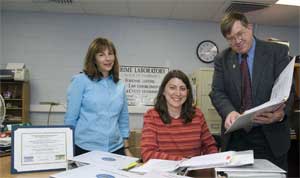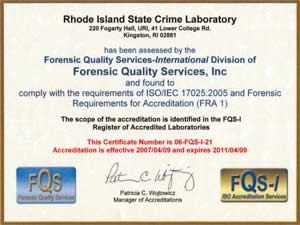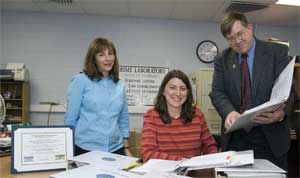 One of few in region to obtain such credential
One of few in region to obtain such credential
KINGSTON, R.I. – May 3, 2007 – The Rhode Island State Crime Laboratory at the University of Rhode Island has been granted international accreditation, the first multi-disciplinary lab in New England to earn the designation.
Concluding a process that began in 2003, the lab has been found to be in compliance with the requirements of the International Organization for Standardization (ISO)/International Electrotechnical Commission (IEC) and Forensic Requirements for Accreditation. Following an assessment by the international division of Forensic Quality Services Inc., the lab, which is based at URI’s College of Pharmacy, was accredited on April 9, 2007. The accreditation is valid through April 2011.
Forensic Quality Services-International, which is based in Largo, Fla., is the leading provider of international accreditation to forensic science testing laboratories in the United States.
 “Receiving international accreditation is the culmination of a long process by our crime lab, but more importantly, it is an outstanding testament to the professionalism of the crime lab staff, and the commitment to the lab by the University of Rhode Island,” said Attorney General Patrick C. Lynch. “In an era when more people than ever are sensitive to the importance of forensic science, we are fortunate to have a resource like the Rhode Island State Crime Laboratory available.”
“Receiving international accreditation is the culmination of a long process by our crime lab, but more importantly, it is an outstanding testament to the professionalism of the crime lab staff, and the commitment to the lab by the University of Rhode Island,” said Attorney General Patrick C. Lynch. “In an era when more people than ever are sensitive to the importance of forensic science, we are fortunate to have a resource like the Rhode Island State Crime Laboratory available.”
Donald E. Letendre, dean of the College of Pharmacy, said the laboratory is an integral part of the College and the entire University. “The College takes its outreach mission seriously whether it involves medication management information, research, or providing the state with a base for its scientific criminal analysis,” said Letendre. “We are proud of the lab’s accomplishments and the leadership role that its director, Dennis Hilliard, has played in the University’s multi-disciplinary Forensic Partnership.”
The lab’s self-evaluation and visit from the assessment team were paid for by federal grants awarded to the University for the State Crime Laboratory through the Rhode Island Justice Commission. Some of the funds were directed to the State Crime Laboratory through the discretion of the Rhode Island Police Chiefs Association.
“Chiefs of the police departments around the state appreciate the work we do for them and their departments, and they realize the importance of accreditation,” Hilliard said. “This is another way law enforcement groups around the state help us continually upgrade the laboratory.”
He said after the O.J. Simpson trial in 1995, crime labs around the country began looking at accreditation. In Rhode Island a study of the state’s forensic services was completed in May 2001. The recommendations of that study enabled Hilliard to convince the federal government and the state legislature that he needed funding to hire additional personnel and purchase the latest analytical equipment. Since March 1992, when he was the only professionally trained criminalist in the lab, Hilliard has hired two firearms examiners, two fingerprint examiners, two trace evidence (paint chips, fibers, etc) examiners and a quality assurance officer. He expanded the lab space thanks to the assistance of Letendre.
Through the leadership of Amy Duhaime, a level 3 criminalist and quality manager for the lab, and Katherine “Kit” Beagan, the lab’s quality assurance officer, lab personnel examined management and technical processes, including scientific analysis, reports, evidence handling, safety, and record keeping.
“Because the accreditation standards are similar to those in hospital labs where Kit and I once worked as medical technologists, we had a solid understanding of what our assessment process had to be,” Duhaime said.
“Documentation of your lab’s processes is critical and documentation of training programs for continuing improvement is essential,” she said.
The self-assessment produced 15 manuals relating to training, evidence handling, lab procedures, an internship program and many other areas.
“We have hard copies of each,” Hilliard said. “The manuals are also online and can be amended whenever the lab personnel see the need for changes and updates.”
A team of three specialists from Forensic Quality Services inspected the facility, interviewed each member of the lab and reviewed the manuals. They also reviewed 10 case files analyzed by each lab examiner. In their report issued in January, the trio came up with 13 findings or issues that needed to be addressed.
“Because of our extensive self-assessment, we already knew what they were and were already addressing them,” Hilliard said. “We had until April to respond to the findings, but we were able to submit our full report in March. We were accredited on April 9th.”
One of the most important outcomes of the process is that each case report must now go through a technical and an administrative review. “Before the accreditation process, the criminalist on the particular case would finish his or her report and send it to the appropriate law enforcement agency,” Hilliard said. “Now our process requires another review by a member of the lab staff. Another set of eyes is always beneficial. This takes much more time and more staff, but it is worth it if we are to provide the highest quality analysis on each case.”
He had high praise for Duhaime and Beagan, saying the project would never have been finished without them. “I rely heavily on all the members of this great team,” Hilliard added.
Duhaime said it was gratifying the way everyone pitched in. “I had never done much administrative work before, and through this I learned how to motivate people and to get them to respond to issues that needed to be addressed with a deadline looming. The mix of people here is great. The more I go to training programs at other labs and in other parts of the country, the more I realize how great we have it here.”
NOTE TO EDITORS: A criminalist applies scientific techniques to the collection of and analysis of physical evidence in criminal cases. Criminalists are the scientists working in crime labs and are typically educated in the areas of chemistry, biology, toxicology, firearms, fingerprints and arson analysis. A criminologist is a scientist who studies of crime as a social phenomenon, criminals, and penal treatment.
Pictured above
BIG STEP FOR CRIME LAB: Members of the Rhode Island State Crime Laboratory at the University of Rhode Island’s College of Pharmacy are all smiles after the lab was granted international accreditation. Lab Director Dennis Hilliard looks over one of the manuals developed for the accreditation process while Katherine “Kit” Beagan, left, the lab’s quality assurance officer, and Amy Duhaime, a level 3 criminalist and quality manager for the lab look on. URI News Bureau photo by Michael Salerno.

